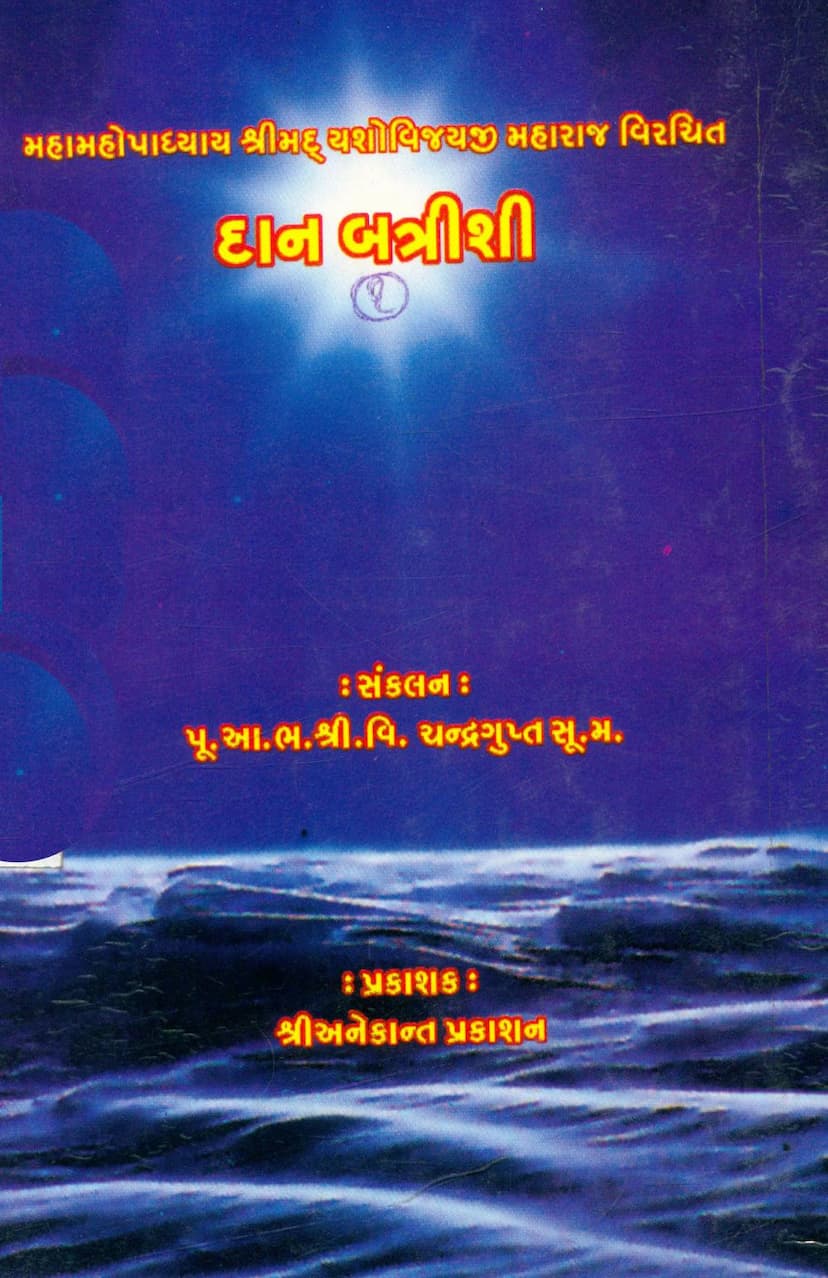Dan Battrishi Ek Parishilan
Added to library: September 1, 2025

Summary
This document is a commentary and analysis titled "Dan Battrishi - Ek Parishilan" (A Study of the Thirty-Two of Charity) authored by Acharya Vijay Chandragupta Suri. It is a commentary on the "Dwatrishat Dwatrishika" (Thirty-Two of Thirty-Two) section of the works of Mahamahopadhyaya Shrimad Yashovijayji Maharaj. The book is published by Shri Anekant Prakashan.
The core of the text is an in-depth explanation and analysis of the "Dan Dwatrishika" (Thirty-Two Verses on Charity), which itself is part of a larger work by Shrimad Yashovijayji Maharaj. The commentary aims to elucidate the principles of charity as expounded in these verses.
Here's a breakdown of the key themes and content discussed in the provided pages:
Introduction and Context:
- The book is presented as a continuation of studies on the works of Shrimad Yashovijayji Maharaj, following a previous commentary on "Diksha Dwatrishika."
- The author highlights the unparalleled genius and profound scholarship of Shrimad Yashovijayji Maharaj, a significant figure in Jainism who lived about 300 years prior.
- The commentary is presented as a humble effort to make the profound teachings accessible to seekers.
Mahamahopadhyaya Shrimad Yashovijayji Maharaj - A Biographical Sketch:
- The text provides a detailed account of Yashovijayji Maharaj's life, emphasizing his extraordinary memory from childhood.
- An anecdote describes how, at a young age, he memorized the Bhaktamar Stotra after hearing it just once, leading to his formal initiation into Jain monasticism.
- His intellectual prowess is highlighted through his studies in Kashi (Varanasi), where he mastered various schools of philosophy and logic, earning the title "Nyay Visharad" (Expert in Logic).
- The text recounts his ability to defeat proponents of other philosophies using his unique "Anekantavada" (the doctrine of manifold aspects) style of argumentation.
- Several anecdotes illustrate his mastery of language and debate, including a challenge to speak without using words from a specific letter class.
- His prolific writing career is mentioned, with numerous works credited to him, making him a significant contributor to Jain literature.
- The text mentions his passing in V.S. 1734 (CE 1677) at Dabhoi.
Core Discussion on Charity (Dan Dwatrishika):
The commentary delves into the specific verses concerning charity, systematically breaking down the concepts:
- Types of Charity: The text distinguishes between "Anukampa Dan" (charity out of compassion) and "Supatra Dan" (charity to a worthy recipient).
- Anukampa Dan is described as providing worldly pleasures, while Supatra Dan, when done with devotion, leads to liberation (Moksha).
- Distinguishing Anukampa and Bhakti (Devotion):
- Anukampa is directed towards those who are deserving of compassion.
- Bhakti is directed towards worthy recipients like monks.
- The text warns against mistaking the recipient, equating giving to the wrong person with a transgression (atichar).
- Defining Anukampa:
- Anukampa is the desire to alleviate suffering, even if the effort causes minor discomfort to other beings (like in Jain worship practices where harming microscopic organisms might be unavoidable for the sake of worshipping the divine).
- The key is that the intention is to relieve suffering without causing greater, significant harm.
- The Concept of "Pushtalambana" (Supportive Cause):
- Charitable acts that promote the teachings of Jainism (Pravachana) are considered "Pushtalambana" and are not subject to the same limitations as ordinary charitable acts, especially those involving potential harm.
- Charity and Intention (Shubhashaya): The purity of intention is paramount. Charity done with a pure heart to uplift Jain teachings is highly valued.
- Naya (Standpoints): The text discusses charity from the perspective of "Vyavahar Naya" (conventional truth) and "Nishchay Naya" (ultimate truth), highlighting how intention and adherence to principles matter.
- Timeliness of Charity: Charity performed at the appropriate time is emphasized.
- The Ideal Recipient: The text elaborates on the characteristics of worthy recipients: monks (Muni), householders with vows (Shravaka), and those with right faith (Samyagdrushti).
- Four Types of Charity: The commentary analyzes four categories of giving based on the recipient (worthy/unworthy) and the purity of the offering (pure/impure).
- Type 1: Giving pure offerings to a worthy recipient is considered the purest and leads to liberation.
- Type 2: Giving impure offerings to a worthy recipient can lead to mixed results depending on circumstances and intentions.
- Type 3 & 4: Giving to unworthy recipients (pure or impure) leads to negative consequences (karma bandha).
- Charity to Monks (Apadharmik): A significant portion discusses the nuances of giving to monks, particularly concerning "Apadharmik" (impure) offerings.
- It explores whether giving to monks under certain circumstances (like scarcity of pure food) is permissible and when it leads to merit or demerit.
- The text clarifies that while generally strict rules apply, exceptions exist for the upliftment of the faith or in dire circumstances, guided by pure intention and the wisdom of learned monks.
- It critically examines the concept of viradhana (harm or transgression) in the context of charity to monks, distinguishing between harm caused by genuine necessity or adherence to principles versus harm caused by negligence or wrong intention.
- The Importance of Discernment: The commentator stresses the need to discern the true nature of a recipient and the offering, warning against acting out of blind faith or personal bias, which can lead to detrimental karmic consequences.
- The Ultimate Goal: The overarching message emphasizes that all acts of charity, when performed with the right intention and understanding, should ultimately lead to spiritual upliftment and liberation.
In essence, "Dan Battrishi - Ek Parishilan" is a scholarly and detailed exposition of Jain principles of charity, grounded in the profound teachings of Shrimad Yashovijayji Maharaj, and illuminated by the insightful commentary of Acharya Vijay Chandragupta Suri. It serves as a guide for understanding the proper way to practice charity, emphasizing intention, recipient, offering purity, and the ultimate spiritual goal.